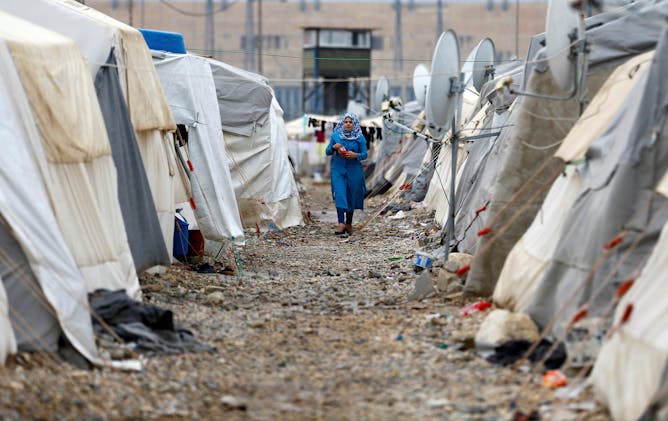|
Sexual violence and harassment transcends national borders and class boundaries, affecting the lives of one in three women in the world. In rural areas of the developing world, many women’s first sexual encounter is non-consensual. Valerie Dobiesz and Julia Brooks set out the disturbing facts.
The World Health Organisation’s decision to name Zimbabwe’s president Robert Mugabe as the goodwill ambassador for non-communicable diseases in Africa was met with widespread condemnation. Tedros Adhanom Ghebreyesus has since rescinded the appointment, much to the relief of the global health community. As Luke Allen and Alice Bouriez explain, violence, political oppression and corruption are anathema to the founding principles of the organisation.
|

Women in crisis settings, such as refugee camps and war zones, are particularly likely to experience sexual assault.
Unit Bektas/Reuters
Valerie Dobiesz, Harvard University; Julia Brooks, Harvard University
Hollywood's sexual predation scandals are just the tip of the iceberg. One in three women worldwide has been physically or sexually assaulted, and many girls' first sexual experience is forced.
|
Arts + Culture
|
-
Kristyn Harman, University of Tasmania
Early colonial New Zealand had no room for reprobates and was at war with Maori resisters. So between 1843 and 1853, it shipped the worst offenders across the Tasman Sea.
-
Lino Camprubi, Max Planck Institute for the History of Science
Devoting all energies to fight over an imaginary border deflects attention from the real issues.
|
|
Business + Economy
|
-
Timothy Njagi Njeru, Egerton University
Kenya's government responded with subsidies to tend to the 2017 maize crisis to ensure that it remained affordable. However, the country needs long term solutions to this perennial challenge.
|
|
Environment + Energy
|
-
Harini Nagendra, Azim Premji University
The population of India's IT hub, Bangalore, grew for centuries because of nature, not despite it – a lesson that could give hope for the future of our modern cities.
-
Rachael Garrett, Boston University; Joice Ferreira, Federal University of Pará
Brazil has been throwing money at Amazonian cattle farmers, hoping they'll adopt 'greener' crops like fruit or corn. A new study shows why loans won't fix the environmental issue presented by ranches.
|
|
Health + Medicine
|
-
Shao Lin, University at Albany, State University of New York
Long after the hurricane's over and the power comes back, residents can still experience lasting mental health issues.
|
|
Politics + Society
|
-
Luke Allen, University of Oxford
Unpicking the baffling case of how one of Africa's dictators became the world's top ambassador for non-communicable diseases – at least for a while.
|
|